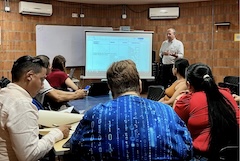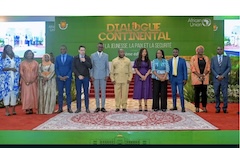While Europe and North America, exhaust themselves with the culture of war, Africa and Latin America continue to advance toward a culture of peace.
Last month, the bulletin described the leadership from the heads of state in Brazil, Colombia and Mexico.
This month, we have published articles advancing the culture of peace at at regional and local levels in Colombia (2), Mexico (2), Ecuador and Chile.
The anthropologist and peace activist Angela Lederach describes the process of “slow peace” in the Colombian territory of Montes de María. She draws three conclusions: first, slow peace is a multigenerational process; second, slow peace centers social-environmental relations; and finally, slow peace demands a shift from technical projects to social movements.
The city government of Cúcuta in Colombia has carried out workshops for youth on historical memory and culture of peace. The workshops, using Hip Hop culture as an educational and transformative tool, contributed to the process of reparation and reconciliation of the victims of the armed conflict.
The National Union of Education Workers and the National Commission for Human Rights of Mexico held a “Peaceful School Coexistence” Drawing Contest as part of the campaign “Arm yourself with courage for a Culture of Peace!”, which promotes respectful and reflective relationships in schools. The winning paintings are presented in the CPNN article.
Also in Mexico, the state government of Jalisco, through the Secretariat of Planning and Citizen Participation, has began the training process in Culture of Peace for the reconstruction of the social fabric, in order to promote communities of care in the municipalities of the State.
In Ecuador, the project “Promoting a culture of Peace and Democracy through the strengthening of Indigenous Justice” has achieved great successes, as more than a thousand people from indigenous organizations have been trained in Indigenous Justice, Gender and New Masculinities and Community Communication, with a high participation of women.
In Chile, the Universidad San Sebastián has launched the innovative Collaborative Project of Vinculación con el Medio Transforming conflicts . Its objective is to strengthen the virtues and skills necessary to resolve disputes peacefully in the school community. Through this initiative, law students actively participate in mediation workshops at Colegio Providencia, promoting a culture of peace that transcends the classroom.
In Africa, the culture of peace is being promoted at the continental, regional and national levels.
The African Union has held its third edition of the youth, peace and security in Africa dialogue Bujumbura, Burundi. Over 1,200 participants, including policymakers, young leaders, and representatives of international institutions are attending and reflecting on effective ways to promote peace education in Africa.
The final report of the 2023 Biennale of Luanda, “Pan-African Forum for the Culture of Peace”, has just been published. The Biennale is a joint initiative of the Government of the Republic of Angola, UNESCO and the African Union that aims to promote conflict resolution and prevention of violence, encouraging cultural exchange and intergenerational dialogue in Africa. The next edition is scheduled for next year.
In Cameroon, students from over 20 countries on the continent, gathered at the Pan African University Institute of Governance, Humanities and Social Sciences,, the African Union’s premiere institution of higher learning, for a strategic discussion on how to promote a culture of peace on the continent. Besides masterclasses and panel discussions with experts from UN agencies, development partners, diplomatic corps, government, and academia, the young scholars also shared experiences of what peace means to them.
The Sougourounoma Initiative for Education, Peace and Health, based in Burkina Faso, has organized the second edition of the International Youth Forum on the Culture of Peace. The meeting, under the theme “Youth, Religion, Mediation and Climate Change in the Sahel and West Africa”, brings together young people from Benin, Mali, Niger, Ivory Coast and Burkina Faso. It allows participants to discuss issues related to peace, including the link between peace and climate change, conflict analysis and interreligious dialogue.
More than 300 young people from across Niger gathered in Maradi recently to explore the part they can play in building peaceful communities, as published by the Bahá’í World News Service. A young participant explained, “The conference helped us understand that we cannot be mere observers of harmful social forces affecting our neighborhoods and villages—we must be active participants in building peace.”
In Abidjan, the Caucus of Women of Côte d’Ivoire for Peace planned a meeting for peace with an expected attendance of more than 5,000 women, including women from the institutions of the Republic, elected officials, women from public and private administration and women economic operators around the theme of peace”.
Last month we concluded: “while leaders from Europe and North America continue to aggravate global warming and threaten World War III, Lula, Petro and Sheinbaum give us hope and vision to help us overcome these crises, which, as Petro says, threaten the extinction of humanity.
This month we can conclude that their hope and vision is shared at the local and regional levels throughout Africa and Latin America.
“Let us listen to them and take action with them!”
|
SUSTAINABLE DEVELOPMENT |
HUMAN RIGHTS |
FREE FLOW OF INFORMATION |
WOMEN’S EQUALITY |
|
TOLERANCE & SOLIDARITY |
EDUCATION FOR PEACE |
DEMOCRATIC PARTICIPATION |
DISARMAMENT & SECURITY |







